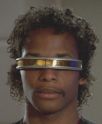|
Rustybear posted:Sorry perhaps I've missed the point here but an infinite set isn't necessarily a universal set so you've snuck in an unwarranted 'necessary' on your conclusion. These arguments are perfectly fine to argue against the Boltzman brain, but you can't just transpose them to this thought experiment like that. You are right, the set being finite does not mean it is universal. However, I have reasonably strong evidence supporting the fact that a configuration containing myself is part of the subset of reachable configurations... And, it's not the set of things that exist that's countable, it's the set of things that can exist within a given radius. There's a known (according to our current understanding) upper bound to the amount of information required to fully describe a region of space. You could maybe argue that the specific configuration we find ourselves in is "special" in some way and only occurs once, but that goes against the cosmological principle, so you'd need to bring in some really strong evidence to that effect. Aramis fucked around with this message at 14:20 on Aug 11, 2020 |
|
|
|

|
| # ? Jun 2, 2024 23:46 |
|
Illuminti posted:But you can't time travel so Roko's Basilisk is completely falsifiable unless it has simulated an entire universe for the sole purpose of torturing its simulations. That's actually the assumption here, among other things. It's that the simulated you in this hypothetical AM-like super AI is identical to you, and the AI is torturing you in the future for knowing that it will exist and not doing anything to help it come into being. It knows that you didn't help it come into existence because it has simulated you in the past (our present) and can simply see what you did. The incredibly vast pile of assumptions built upon assumptions that would lead to someone being genuinely upset and losing sleep over this idea (one of which being that it's possible for computers to simulate universes or human minds at all), is so mind-bogglingly huge that it is hilarious to see a community of supposed "rational thinkers" contort themselves into knots over it. EDIT: Dwarf planet Ceres is geologically active This right here - this is why I support space exploration. Extensive probe-based space exploration, and eventually manned space exploration. There is a chance that we could discover evidence for a second genesis right here in our own solar system!!! There could be things living in the liquid oceans of Enceladus and Europa right now!! And the best way to make these discoveries and learn as much as possible about them is to extensively map our solar system's life-candidates, and then send people up there to stay, long-term, and do the kind of intuitive exploration and ground-breaking that only humans can do right now. (My equation for manned spaceflight changes, though, if we invent AGI / brain uploading.) DrSunshine fucked around with this message at 14:51 on Aug 11, 2020 |
|
|
|
Aramis posted:These arguments are perfectly fine to argue against the Boltzman brain, but you can't just transpose them to this thought experiment like that. no sorry to stick on this point but you're still not explaining why it's likely that the set of 'things which can exist' contains replicas (lets say replicas because they're not duplicates insofar as they're not co-located) other than: A. it's happened at least once, B. the set is infinite. this is not the most intuitive point but think about it terms of sets of integers: being a 'replica' is a property like being divisible by 3. So say our current local state of affairs is '3' and a replica state of affairs is '6'. The infinite set with the most replication would therefore be {3, 6, 9, 12...}. But all we know is {3...} so we could be in {3, 58, 398765, 2x10^27...} or even {3, -457044, 5x10^9...}. Since all these sets have the same cardinality and there are far are more sets containing far more objects that are not divisible by 3 it's improbable that we are in a set with very many replicas, and in fact they have an inverse relationship; the more replicas you posit the smaller the probability you are in that set.
|
|
|
|
Rustybear posted:no sorry to stick on this point but you're still not explaining why it's likely that the set of 'things which can exist' contains replicas (lets say replicas because they're not duplicates insofar as they're not co-located) other than: Your are missing the fact that there is a finite number of "roots", yet the set is still infinite. So not only must the set necessarily contain replicas, but the portion of the set that is unreplicated is infinitesimal. Aramis fucked around with this message at 15:50 on Aug 11, 2020 |
|
|
|
Aramis posted:Your are missing the fact that there is a finite number of "roots", yet the set is still infinite. So not only must the set necessarily contain replicas, but the portion of the set that is unreplicated is infinitesimal. A set containing all odd numbers is infinite, but ‘3’ only exists once. Boltzmann Brains are just a sliiiiiightly less stupid Roko’s Basilisk.
|
|
|
|
Captain Monkey posted:A set containing all odd numbers is infinite, but ‘3’ only exists once. Boltzmann Brains are just a sliiiiiightly less stupid Roko’s Basilisk. Boltzman brains are not what's being discussed here.
|
|
|
|
The interesting thing about Roko's Basilisk is it makes for a great premise for an episode of Outer Limits. Where you wake up one day and realize you're trapped in a simulation by something similar to AM from I have no Mouth and I must Scream because it turns out you didn't donate 2$ to some crazy guy's AI project. In my D&D game the current plot about a cult of a dead cult are trying to bring him back to end the world because if they know of the dead god and don't work at it then they'll be tortured for eternity, so they work their hardest to bring them back.
|
|
|
|
Captain Monkey posted:A set containing all odd numbers is infinite, but ‘3’ only exists once. Boltzmann Brains are just a sliiiiiightly less stupid Roko’s Basilisk. *Shrugs* based on certain assumptions, they could exist, and they were a legitimate area of discussion amongst real scientists. The question is whether those assumptions are valid for which overall models of how the universe works. Rokos basilisk is blatantly just Pascal's wager for nerds.
|
|
|
|
I find that a lot of the singularity/ASI talk to be really thinly-disguised theology in that sense. Replace "Artificial Superintelligence" with "God" and you'll find a 1-1 correspondence between the arguments and ideas posed by, say, medieval theologians and techno-nerds now. It's a shame, because the existential risk studies field is a pretty legitimate field of study that asks a lot of interesting questions about moral and ethical behavior of societies on the long-term, but because there's so much crossover between it and the techno-futurist AI research camp, there's an unfortunate strain of "Superintelligent AI theology" that runs deep in the existential risk community.
|
|
|
|
DrSunshine posted:I find that a lot of the singularity/ASI talk to be really thinly-disguised theology in that sense. Replace "Artificial Superintelligence" with "God" and you'll find a 1-1 correspondence between the arguments and ideas posed by, say, medieval theologians and techno-nerds now. It seems like it's going to be hard to talk about the idea of things with better intelligences than humans without overlapping with the people that spent all day talking about a higher intelligence. It doesn't seem worth being upset about.
|
|
|
|
Communist Thoughts posted:I found the stuff about the impossibility of intergalactic travel posted itt really interesting. Is there any more of that? Intergalactic travel is easy. Don't be a fool and try to travel to nearby galaxies; just wait for them to merge with you. Communist Thoughts posted:Same with any stuff about the speed of light, even an interstellar empire would be completely hosed temporally. What? Why? An interstellar civilization in a star cluster is entirely plausible. Sure, they'd face communication delays an order of magnitude or more greater than empires in the age of sail, but that's not an existential problem. Communist Thoughts posted:It did make me think a good way to terraform a planet would be to send a probe ahead to spray primordial ooze at any habitable planet in the system then in the millions or billions of years it takes to travel to the system you get some nice ferns and an atmosphere and oh poo poo ape infestation! This is basically directed panspermia and as a hypothesis for the origin of life it is a crank-filled rabbit warren (and also along the same lines as a terrible Star Trek episode).
|
|
|
|
eXXon posted:What? Why? An interstellar civilization in a star cluster is entirely plausible. Sure, they'd face communication delays an order of magnitude or more greater than empires in the age of sail, but that's not an existential problem. Additionally while we generally being scifi nerds love the idea of big interstellar empires; in reality though its interesting to point out that there's virtually no need or requirement. We put our entire history in a big database on a ship with the colonists and send them off; we might never really meaningfully communicate with them but we've essentially created a "child" civilization that will continue on from where we were when we sent them; 100 such civilizations at varying distances insures our survival as a species for millions of years even if we as a discrete continuous civilization does not and honestly that's fine in the long term even if it's sad to lose some of the romanticism of space opera science fiction in the grim reality of physics.
|
|
|
|
Raenir Salazar posted:Additionally while we generally being scifi nerds love the idea of big interstellar empires; in reality though its interesting to point out that there's virtually no need or requirement. We put our entire history in a big database on a ship with the colonists and send them off; we might never really meaningfully communicate with them but we've essentially created a "child" civilization that will continue on from where we were when we sent them; 100 such civilizations at varying distances insures our survival as a species for millions of years even if we as a discrete continuous civilization does not and honestly that's fine in the long term even if it's sad to lose some of the romanticism of space opera science fiction in the grim reality of physics. Actually, if you think about things in terms of galactic colonization (assuming a lifeless galaxy), which would take place over millions of years, that'd be enough time for simple genetic drift and evolution to occur such that whatever descended from an initial colonization effort would become different species, an entirely different biosphere. It's almost more sensible to think of intelligent spacefaring civilization as the basic unit of reproduction for a planetary biosphere. So, assuming that a colony ship would bring samples of its parent ecology to whatever new worlds or space colonies it built, it would be giving its parent ecology the chance to expand life itself -- rather than merely a single species. Thought of in this sense, the space colonization effort takes on a drastically different meaning and gains a great deal more significance, in my view. We should think of it less in the 1950s sci-fi view of Manifest Destiny, colonizing the West, etc. That's an inherently oppressive, and moreover racist, imperialistic notion. Instead, it's more akin to life colonizing and developing on newly-born, desolate volcanic atolls. In our case, we would be the "seed" species, the initial spreaders that allow the rest of the planetary ecosystem to follow. I conceive of space exploration and colonization as the ultimate effort to preserve, and nourish, the existence of Earthly life itself. In 500 million years our planet has birthed how many countless different forms of multicellular life? How many endless forms most beautiful must have arisen and disappeared on our world? Yet 500 million years is only a fraction of the span of time on a cosmic scale. How many more kinds of life might arise -- even intelligent life to share the universe with and speak with -- if we could start the process?
|
|
|
|
I think there's plenty of interesting territory for speculative sociology and fiction of non-FTL interstellar civilizations. Communication between colonies* ~tens of light years apart is technically trivial but has fascinating consequences for how societies are structured. Even an intermediate stage where relativistic interstellar travel is possible but realistically expensive and difficult has a lot of potential. The Forever War explored cultural evolution over hundreds of years with time dilation and cryogenics with, uh, not a great deal of nuance or sensitivity, but not many other novels since then even tried. *make them orbital if you're unhappy with the idea of contaminating planetary surfaces. Precambrian Video Games fucked around with this message at 00:28 on Aug 12, 2020 |
|
|
|
 The surface of the asteroid Ryugu taken by the Japanese spacecraft Hayabusa-2 Amazing to think about that little spacecraft sitting up there on an asteroid. Literally the most boring lump of rock, but the picture gives me the tingles.
|
|
|
|
Illuminti posted:
Nice Kerbal Space Program flex, post your craft file. Nah, I agree, it's incredible we were able to do this!! I wonder what the next awesome thing will be to try and land a probe on?
|
|
|
|
I'm getting the opposite of whatever Thalassaphobia is  Just look at the pure darkness that's up in the frame and just recoil in fear at such an endless void. Just look at the pure darkness that's up in the frame and just recoil in fear at such an endless void.
|
|
|
|
Illuminti posted:
hematite
|
|
|
|
Raenir Salazar posted:I'm getting the opposite of whatever Thalassaphobia is  Don't go into space, there's monsters! Here's a bit of anthropic reasoning to puzzle your brain. I was pondering about this earlier today. It's gonna sound kind of dumb, but here it goes. So, why is it that we can observe the universe? If we consider the acceleration in the expansion of the universe, it's very likely to be the case that in the very far future, the rest of the universe will be so far away from an observer that all they will observe is black nothingness, as light that has been emitted from other galaxies will never be able to reach them anymore. Our 'universe' will shrink down over trillions of years, to be just the size of our local galactic supercluster, then to only our galaxy. Observers in the future will think that theirs is the only galaxy that exists. But that's not what we observe right now. If we look up at the sky, we turn our telescopes and can see the light of galaxies from 13 billion light years away. This tells us that we're actually rather early in the history of the universe right now, that we can observe an entire universe (or part of it at least) when we look up. Onto the anthropic part. If we assume the probability of observing civilizations to come into existence to be normally distributed, we would expect that, over the lifetime of the universe, we would come into being more towards the middle of that time period. In other words, if the probability for a civilization to come into existence is non-negligible, then you would expect that one would have to arise at some point in the universe's existence. But if you think about it in terms of very large numbers, you would expect that the most likely time for this to happen would be in the very very far future, after many trillions of years had passed, since there would be plenty of time for it to happen - keeping in mind that bell curve. You wouldn't expect to see a civilization arise towards the very beginning of the universe's existence, unless the probability was either very close to 1 or very close to 0. That brings me back to my earlier point - we observe a universe early in its life. There's many new stars being born, and many young stars. We can actually observe distant galaxies. In which case there should be a lot more time ahead of us than there is behind us. So that should lead us to conclude one of the following: 1) We are the first, or among the first, and are very very lucky (probability very close to 0). 2) The probability of intelligent observers coming into existence is very close to 1, and happens as soon as conditions (whatever they may be) allow it. Correct me if my reasoning is faulty.
|
|
|
|
DrSunshine posted:
Reminds me of a few different youtube video's I've seen: Liminal Spaces Fear of Depths
|
|
|
|
Rustybear posted:Ok weird hangup I know, but no it doesn't, infinite doesn't mean universal. Something being infinite doesn't mean it must contain anything and everything you can dream of. I mean you're not wrong, but what you say is exactly what I said in the second part of my post? Raenir Salazar posted:The interesting thing about Roko's Basilisk is it makes for a great premise for an episode of Outer Limits. Where you wake up one day and realize you're trapped in a simulation by something similar to AM from I have no Mouth and I must Scream because it turns out you didn't donate 2$ to some crazy guy's AI project. Check out the episode USS Callister of Black Mirror if you haven't already. 
|
|
|
|
WAR CRIME GIGOLO posted:hematite Bit rude....
|
|
|
|
Asteroid Ryu Lander Hayabusa Ryu...Hyabusa There’s probably something about Japanese that I don’t understand rather than a space mission named after Ninja Gaiden.
|
|
|
|
It’s ryugu. Also, Hayabusa is ‘peregrine falcon’ which is a reasonable name for a spacecraft. Edit: The name refers to Ryūgū (Dragon Palace), a magical underwater palace in a Japanese folktale. In the story, the fisherman Urashima Tarō travels to the palace on the back of a turtle, and when he returns, he carries with him a mysterious box, much like Hayabusa2 returning with samples. Yngwie Mangosteen fucked around with this message at 04:34 on Aug 12, 2020 |
|
|
|
That’s pretty cool. We should name more space poo poo after birds.
|
|
|
|
Senor Tron posted:How would we know? I agree it's a meaningless thing, but maybe something like quantum uncertainty or there being a slow speed limit to the universe is the result of such meddling, and since we only have one universe to observe we just write those things off as being part of its fundamental laws. As I said, everything we observe appears to be absolutely consistent with no interference or meddling whatsoever. We've looked for various sorts of anomalies, like a changing speed of light over time, or a changing value of the fine structure constant, which would leave very tell-tale signatures. (We didn't look because we thought there would be interference from aliens - we looked because a) some conjectures/models predicted it might take place due to natural effects and b) we were curious and wanted to test our assumptions.) Bupkis. Could it be that some incredible intelligence has a way to manipulate reality such that it could still achieve such feats and leave us none the wiser? If we accept that reality is that malleable, I think we're in agreement about the meaninglessness of such speculation. So yeah - we'd either be able to tell or there's no sense asking the question.
|
|
|
|
If some civilization out there caused the universe to drop into a lower vacuum state, would we see it slowly arrive as galaxies farther out were reduced to subatomic particles or would we just get torn apart as the vacuum instantly dropped to a more stable state?
|
|
|
|
In theory it would collapse the metric at the speed of light - we'd never see it coming and never know it happened.
|
|
|
Raenir Salazar posted:because it turns out you didn't donate 2$ to some crazy guy's AI project. What a grift. Let's setup a charity with the explicit goal to create a malevolent AI that wants to torture those who didn't help it be created and then ask for donations on the loony message board full of people who actually lost sleep over it.
|
|
|
|
|
D-Pad posted:What a grift. Let's setup a charity with the explicit goal to create a malevolent AI that wants to torture those who didn't help it be created and then ask for donations on the loony message board full of people who actually lost sleep over it. Isn't that just scientology.
|
|
|
|
DrSunshine posted:If we consider the acceleration in the expansion of the universe, it's very likely to be the case that in the very far future, the rest of the universe will be so far away from an observer that all they will observe is black nothingness, as light that has been emitted from other galaxies will never be able to reach them anymore. Our 'universe' will shrink down over trillions of years, to be just the size of our local galactic supercluster, then to only our galaxy. Observers in the future will think that theirs is the only galaxy that exists. It's a common misconception that galaxies are dropping out of our observable universe* (because cosmology is confusing) but the opposite is true; there are distant galaxies that are not visible to us now that will be in the future, even if what's visible is light emitted in the distant past. It is true that every galaxy outside of the local supercluster will get redshifted more and more, so distant future astronomers will have to beg and cajole their funding agencies to build ever-larger radio telescopes (also to observe the cooler and fainter cosmic radio-by-then background). Our local supercluster will take some time to collapse and I suppose there will be some lucky galaxies hurled at almost exactly escape velocity that would be observable for a very long time. If you mean the very very distant future where everything is redshifted to infinity, well, fine. Wikipedia (which is largely a mess as far as cosmology and astrophysics go) claims 100–150 billion years to be the time when "The Universe's expansion causes all galaxies beyond the former Milky Way's Local Group to disappear beyond the cosmic light horizon, removing them from the observable universe.", which I think is wrong, and not exactly what the cited paper actually says, which is that "at that time, not only external galaxies but also the nearest extragalactic protons will be pushed out of our [event] horizon and not be available for tracing the cosmic expansion". Pushed out of the event horizon doesn't mean unobservable*, though I grant that the second part about not being able to trace cosmic expansion may be true. But given that the paper argues for using hypervelocity stars (i.e. stars escaping our merged supergalaxy) for cosmology, those aforementioned hypervelocity galaxies could conceivably serve the same purpose until there aren't enough left to infer cosmological parameters with. Also, you may be interested in this paper that deals with the anthropic principle part of the argument. *unless your definition of observable universe is something other than the volume within the particle horizon, I suppose?
|
|
|
|
Antifa Turkeesian posted:If some civilization out there caused the universe to drop into a lower vacuum state, would we see it slowly arrive as galaxies farther out were reduced to subatomic particles or would we just get torn apart as the vacuum instantly dropped to a more stable state? we’ve created small areas of vacuum that has less local energy density than the normal vacuum does already, and we haven’t seen such a thing happen. In fact the universe places constraints on negative energy density in a different way, using quantum inequalities such as the “quantum interest conjecture”. this means that a burst of negative energy must be followed in a very short time by an even larger burst of positive energy. One can think of the negative energy as a "loan" charged to Heisenberg's credit card that must be repaid within a time that becomes shorter as the amount of energy "borrowed" becomes larger. this is a major setback to building a faster than light drive. PawParole fucked around with this message at 09:28 on Aug 12, 2020 |
|
|
|
https://www.sciencedaily.com/releases/2019/10/191002102750.htm here’s a somewhat recent article that explains it far better than I could.
|
|
|
|
PawParole posted:we’ve created small areas of vacuum that has less local energy density than the normal vacuum does already, and we haven’t seen such a thing happen. In fact the universe places constraints on negative energy density in a different way, using quantum inequalities such as the “quantum interest conjecture”. You're thinking of "negative energy", the person you're quoting is asking about "vacuum collapse". https://en.m.wikipedia.org/wiki/False_vacuum In a vacuum collapse scenario, everything as we know it is probably destroyed within an area of space that expands at the speed of light. There's no way to see it coming, and it's impossible to stop or survive, so it's one of the more frightening scenarios.
|
|
|
|
DrSunshine posted:If we assume the probability of observing civilizations to come into existence to be normally distributed, we would expect that, over the lifetime of the universe, we would come into being more towards the middle of that time period. Is there a reason to assume this, though? If early-universe conditions are better for the emergence of intelligent life for whatever reason, then it's less improbable that we're showing up early.
|
|
|
|
Bug Squash posted:You're thinking of "negative energy", the person you're quoting is asking about "vacuum collapse". https://en.m.wikipedia.org/wiki/False_vacuum if the false vacuum was true then any attempt at creating an energy density lower than what is the usual state would cause a vacuum collapse, yet we have done so and we are still here.
|
|
|
|
PawParole posted:if the false vacuum was true then any attempt at creating an energy density lower than what is the usual state would cause a vacuum collapse, yet we have done so and we are still here. Yeah - no. You're reading this wrong, sorry. You can't extract energy to do work from the vacuum. It's impossible. The article you posted actually discusses this. The article itself is referring (somewhat obliquely) to vacuum fluctuations. Any energy 'borrowed' must be 'repaid.' There's a reason it's called 'zero-point' energy - it's not actually thermodynamically viable energy in any sense. The vacuum collapse scenario involves a situation where the Higgs field (currently stuck in a position where it has a positive energy density in every point in spacetime) decays into a lower energy state because that state is more intrinsically stable than its current energy state. That would make the current vacuum state a 'false' vacuum as it would only have been meta-stable. Right now, there's no good reason to suspect that we're in a false vacuum state, but you never know.
|
|
|
|
If all the bodies in the universe are expanding away from eachother(?) doesn't that mean that as time goes on it becomes harder and harder for any civilisation to make it to another star? without some kinda magical technology that trivialises distance anyway ashpanash posted:the Higgs field (currently stuck in a position where it has a positive energy density in every point in spacetime) What does this mean? Also the false vaccuum theory is cool, maybe the universe works like atomic orbitals and there are several different configurations if you cross certain energy bounds
|
|
|
|
Communist Thoughts posted:What does this mean? If you measured the electron field, the photon field, every other quantum field in nature in its vacuum state (i.e., without disturbances (particles)) you'd find an energy density that hovers around the zero point. [It can't be exactly zero at all times because of the uncertainty principle.] If you measure the Higgs field in its vacuum state, you'll find a positive energy density. Note that these all gauge fields, so you'll find the Higgs field has a positive energy density *relative* to the other fields in their vacuum state. In case you're curious, you can't extract work from the energy in the Higgs field - it's positive energy condition is nonetheless at equilibrium in what amounts to its own current 'zero point', and energy can't be extracted from the vacuum state, even into other fields.
|
|
|
|

|
| # ? Jun 2, 2024 23:46 |
|
eXXon posted:It's a common misconception that galaxies are dropping out of our observable universe* (because cosmology is confusing) but the opposite is true; there are distant galaxies that are not visible to us now that will be in the future, even if what's visible is light emitted in the distant past. It is true that every galaxy outside of the local supercluster will get redshifted more and more, so distant future astronomers will have to beg and cajole their funding agencies to build ever-larger radio telescopes (also to observe the cooler and fainter cosmic radio-by-then background). Our local supercluster will take some time to collapse and I suppose there will be some lucky galaxies hurled at almost exactly escape velocity that would be observable for a very long time. Alright, it seems that I was mistaken about the accelerating expansion of the universe eventually making it impossible to observe anything farther than our galaxy. That's a comforting notion.  At any rate, let's pretend I said "Why don't we observe a redder universe?" or something of that nature. At any rate, let's pretend I said "Why don't we observe a redder universe?" or something of that nature. Still, there's something I'm not quite understanding about how this works. For example, say star A and star B are 1 light year apart. The expansion of the universe is 1 ly/y. The acceleration of the expansion is 1 ly/y/y. If a photon is emitted from star A at time 0, and travels for 1 year, by the time the light gets 1 light year out, the universe will have expanded by 1 more light year. By year 2, after the photon travels another year, the universe will have increased in size by two more light years. How could light from Star A ever reach Star B?
|
|
|



























